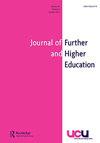是什么在蚕食吉尔伯特的成绩?研究食品不安全和心理困扰对澳大利亚大学生加权平均分的影响
IF 2.4
Q1 EDUCATION & EDUCATIONAL RESEARCH
引用次数: 1
摘要
大学生买不起或吃不到营养食品的问题日益严重。尽管研究表明,粮食不安全对学生的幸福感和参与度产生负面影响,但很少有研究探讨其对学业成绩的影响。这些研究大多使用来自美国大学样本的自我报告的学业表现测量方法。目前的研究新颖之处在于,它探讨了澳大利亚大学样本中的粮食不安全问题,并使用了实际的学习成绩(加权平均分数;WAM),而不是依赖于自我报告的成绩。我们还考虑了心理困扰在粮食不安全和学业成绩之间的关系中的作用。参与者包括澳大利亚墨尔本一所公立大学的664名18至25岁的本科生。四分之一的学生(25.5%)被列为粮食不安全。租房、领取政府福利、残疾和年龄较大与食物不安全呈正相关,而食物不安全与学习成绩较差和心理困扰增加有关。心理困扰部分地介导了WAM与粮食不安全之间的关系,这意味着经历粮食不安全的学生更有可能经历更大的心理困扰,从而损害他们的学习成绩。大学生中普遍存在的粮食不安全现象表明,旨在改善心理健康和获得食物的途径的干预措施可以有助于提高大学学业的成功,特别是对那些负担不起或无法获得营养食物的学生而言。本文章由计算机程序翻译,如有差异,请以英文原文为准。
What is eating Gilbert’s grades? Examining the impact of food insecurity and psychological distress on weighted average marks within a sample of Australian university students
ABSTRACT There is a growing issue of university students not being able to afford or have access to nutritious food. Although research reveals that food insecurity negatively impacts student well-being and engagement, few studies have explored its impact on academic performance. Most of these studies use self-reported measures of academic performance in college samples from the United States. The current study is novel in that it explores food insecurity in an Australian university sample and uses actual academic performance (weighted average marks; WAM) rather than relying on self-reported grades. We also consider the role of psychological distress in the relationship between food insecurity and academic performance. Participants comprised 664 undergraduate students aged 18 to 25 years at a public university in Melbourne, Australia. One-quarter of students (25.5%) were classified as food insecure. Renting, receiving government benefits, having a disability and being older were positively associated with food insecurity and food insecurity was associated with poorer academic performance and increased psychological distress. Psychological distress partially mediated the relationship between WAM and food insecurity, meaning that students experiencing food insecurity are more likely to experience increased psychological distress which then impairs their academic performance. The prevalence of food insecurity in university students suggest that interventions aimed at improving both mental health and access to food could serve to enhance success at university, especially for students who cannot afford or do not have access to nutritious food.
求助全文
通过发布文献求助,成功后即可免费获取论文全文。
去求助
来源期刊

JOURNAL OF FURTHER AND HIGHER EDUCATION
EDUCATION & EDUCATIONAL RESEARCH-
CiteScore
5.20
自引率
4.30%
发文量
80
期刊介绍:
Journal of Further and Higher Education is an international, peer-reviewed journal publishing scholarly work that represents the whole field of post-16 education and training. The journal engages with a diverse range of topics within the field including management and administration, teacher education and training, curriculum, staff and institutional development, and teaching and learning strategies and processes. Through encouraging engagement with and around policy, contemporary pedagogic issues and professional concerns within different educational systems around the globe, Journal of Further and Higher Education is committed to promoting excellence by providing a forum for scholarly debate and evaluation. Articles that are accepted for publication probe and offer original insights in an accessible, succinct style, and debate and critique practice, research, theory. They offer informed perspectives on contextual and professional matters and critically examine the relationship between theory and practice across the spectrum of further and higher education.
 求助内容:
求助内容: 应助结果提醒方式:
应助结果提醒方式:


